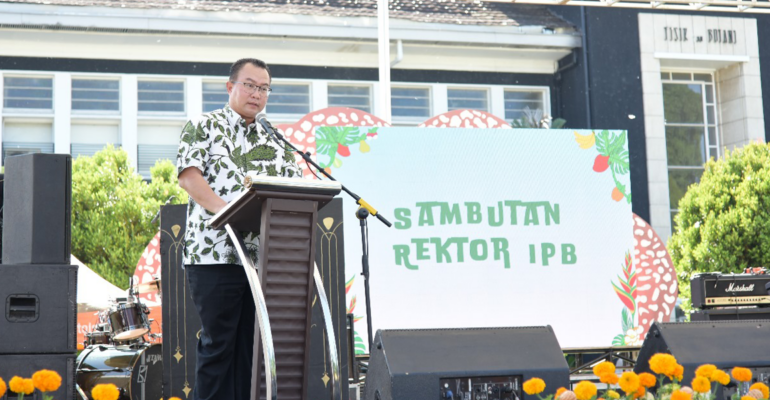Welcoming the Peak Event of FBBN 2023, Rector: IPB University Has Developed Red and White Marigold Flower Color Varieties

IPB University in collaboration with the Ministry of Agriculture (Kementan) RI reorganized the Flower and Fruit Festival Nusantara (FBBN) in 2023. The opening of the event was held at IPB Campus Baranangsiang, Bogor (22/9).
The Rector of IPB University, Prof Arif Satria in this activity said that IPB University has 116 varieties of food crops, including flower and fruit varieties. One example is marigold, a flower whose seeds have been imported. Marigold is a flower that is always used by the Balinese during religious ceremonies.
“For religious ceremonies alone we import. Therefore, IPB University has developed a type of marigold flower with red and white color variations that have been launched in Bali,” he said.
Furthermore, Rector added that marigolds have many benefits. In addition to drinks and food such as tea and tempura, marigold flowers can also be used as decoration.
“The role of local fruit production to supply food needs must continue to be improved. The ability of local production must be maintained to encourage farmers to keep producing. Because when imported, it discourages farmers from producing. This is dangerous,” he added.
Through this FBBN, the Rector also mentioned that local fruits that are now rare such as menteng, semanggi, or kemang, can be developed again for national food independence.
Chairman of the committee, Teguh Herlambang, said FBBN was organized to improve the welfare of local farmers and to promote the diversity of flowers and fruits in the archipelago. This year’s theme is ‘Spread the Wealth of Flowers and Fruits of the Archipelago’.
“FBBN is held to improve the welfare of local farmers and promote the diversity of fruits and flowers in the archipelago. This activity focuses on the development of agribusiness centers and the use of technology to gain public attention and stakeholders to realize the orange revolution in advancing Indonesian flowers and fruits,” he explained.
Appreciation was expressed by the Regional Secretary of Bogor City, Dr Hj Syarifah Sofiah. Although Bogor City is not an agricultural producer, there are quite a lot of innovations produced. According to her, this is because Bogor City has IPB University and agricultural research institutions that make it a center of excellence in agricultural development.
Director of Fruit and Floriculture, Directorate General of Horticulture, Ministry of Agriculture, Dr Liferdi Lukman added that Indonesia is now the 4th largest fruit producer after China, India, and Brazil. Mangosteen is number 1 in the world. He also mentioned that the Ministry of Agriculture currently has a fruit and ornamental plant village program to encourage the economy of the community.
“Indonesia already has a large-scale avocado center with a collection of 80 variants. This is very potential with the available market. As for grapes, they can be developed in urban areas with limited land. It can be a terrace grape model or a car parking lot grape,” he said. (dh/Rz) (IAAS/TNY)



